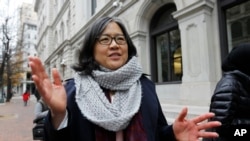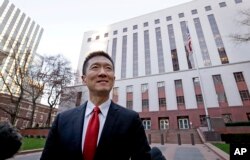The U.S. State Department said Friday that it had begun implementing President Donald Trump's order limiting travel into the country.
The order, which was given the go-ahead by the Supreme Court on Monday, restricts travelers to varying degrees from eight countries, six of them with Muslim-majority populations. The countries are Chad, Iran, Libya, Syria, Somalia, Yemen, Venezuela and North Korea.
The State Department said in a statement that no visas would be revoked under the new vetting procedures. It also said the restrictions were not intended to be permanent. They "may be lifted as countries work with the U.S. government to ensure the safety of Americans."
Meanwhile, the 4th U.S. Circuit Court of Appeals in Virginia assailed a Trump administration lawyer on Friday with questions about the president's travel order.
Deputy Assistant Attorney General Hashim Mooppan said the travel restrictions differed from earlier versions because they reflect "a multiagency, worldwide review, engagement and recommendation process."
Mooppan also told the 13 judges that the Supreme Court had sent a "strong signal" by ruling that the travel order could be implemented. The high court granted an administration request to implement the order after two appeals courts, including the 4th Circuit, had limited it.
The appellate judges' questions indicated they weren't so sure that the review settled matters.
Questions about tweets
Noting that the review is classified and the judges had not seen it, Judge James Wynn Jr. asked about information that has been made publicly available, Trump's tweets: "Do we just ignore reality and look at the legality in how to determine this case?"
Wynn was not the only judge to ask about the tweets.
"So you're suggesting, counsel, while the president may be showing anti-Muslim bias in his tweets, that cannot be taken over into the content of the proclamation?" Judge Barbara Milano Keenan asked.
"And the president's tweets, you've already conceded, are official statements of the president of the United States and that they should be subject to charitable interpretation. There was a tweet a month before the proclamation was signed by the president, tweeting a statement that shooting Muslims with bullets dipped in pig's blood should be used to deter future terrorism. How am I to interpret that charitably?" Judge Stephanie Thacker asked.
Along with the 9th U.S. Circuit Court of Appeals on the West Coast, the Virginia court is considering the legality of the travel order. In its ruling Monday, the Supreme Court said the lower courts should continue to consider the matter.
The 4th Circuit has been asked to overturn a decision by a Maryland judge whose injunction in October barred the administration from enforcing the ban against those travelers from Chad, Iran, Libya, Somalia, Syria and Yemen who have bona fide relationships with people or organizations in the U.S.






